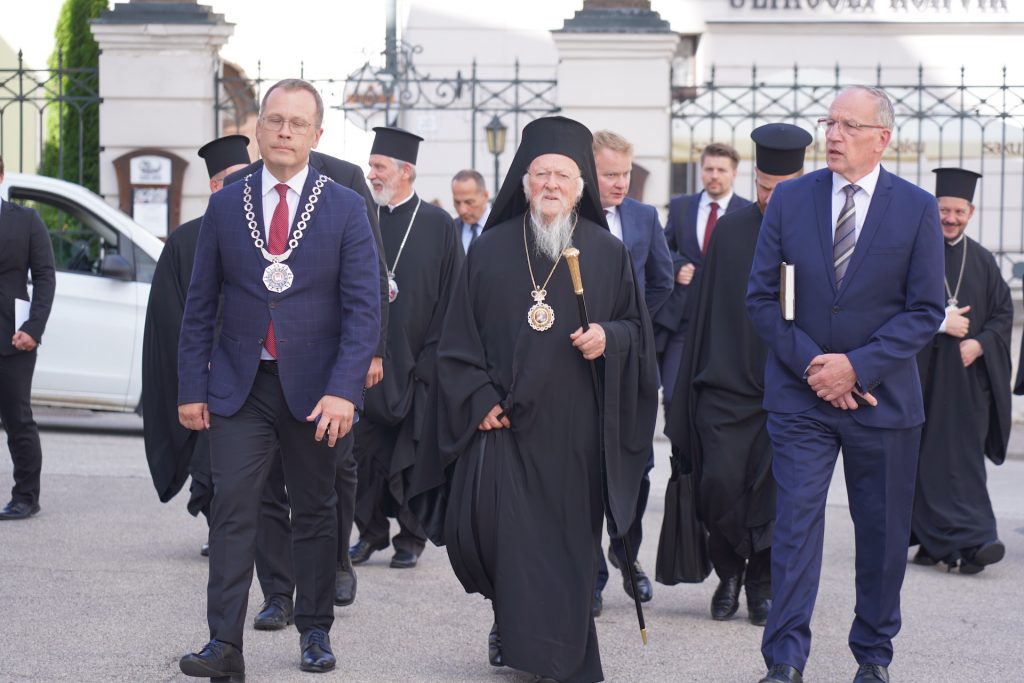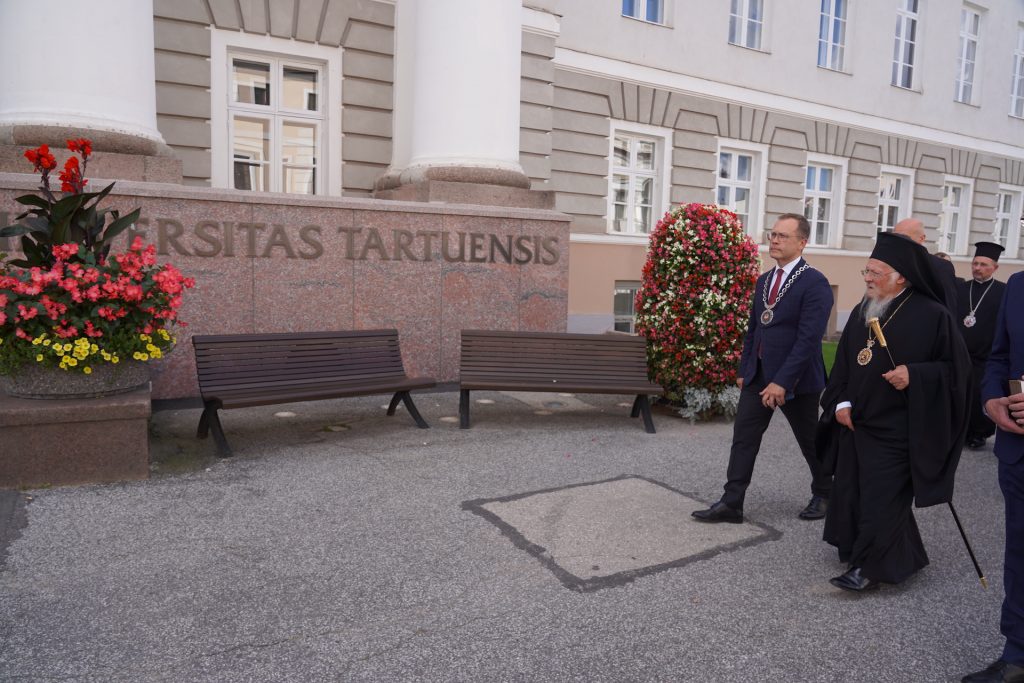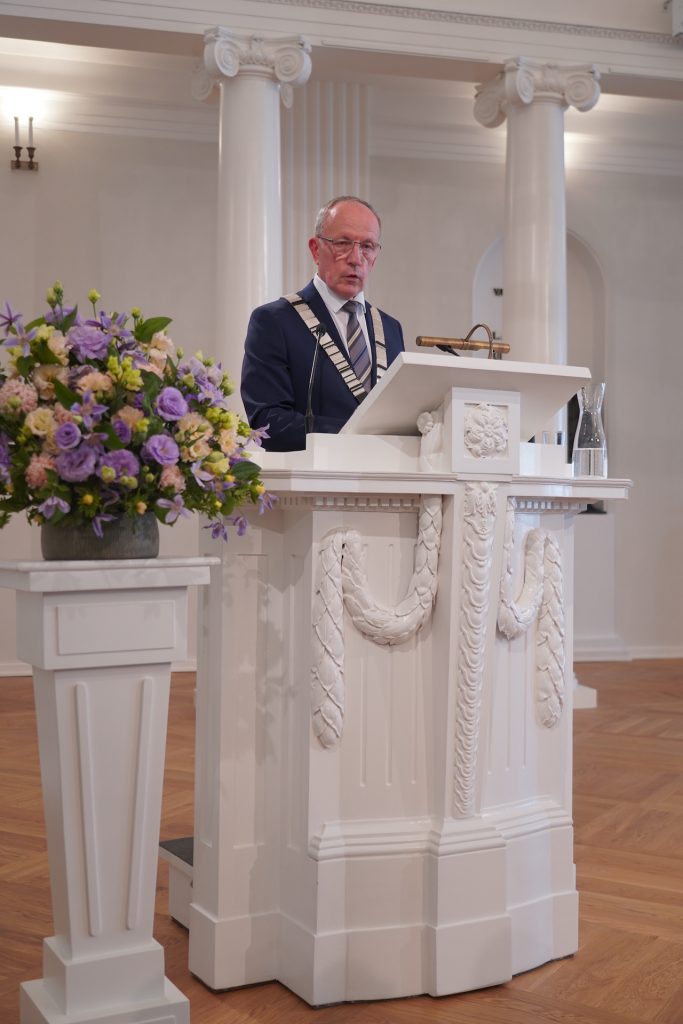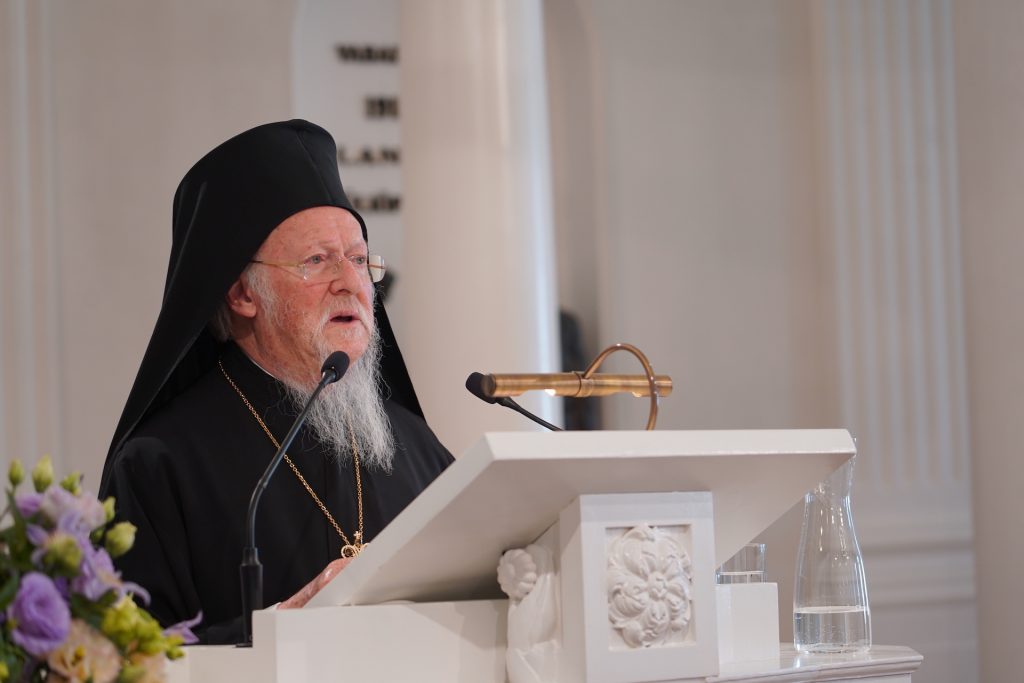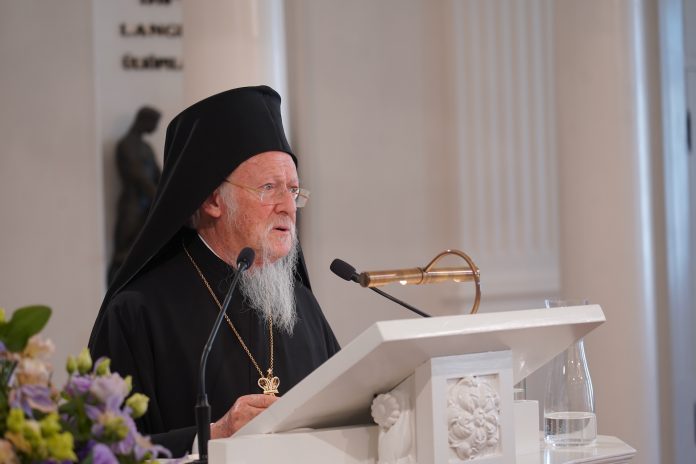Keynote Address by His All-Holiness Ecumenical Patriarch Bartholomew on Environmental Education (University of Tartu, September 15, 2023)
Ecological Awareness and the Role of Education
Your Magnificence Rector of the University of Tartu,
Esteemed Mr. Mayor,
Your Eminences,
Esteemed Faculty Members,
Honorable guests,
Beloved students,
We are very happy to participate in this conference, which is dedicated to ecological education and concerns what many consider to be the most serious problem that humanity has been called to face in the course of history.
Mankind today, despite unprecedented progress in many fields of culture, in science, technology and the organization of social life, cannot be proud of its attitude towards the natural environment. It created the ecological problem and, while it knows the magnitude of the environmental disaster, it does not come to its senses, it does not change its behavior towards nature, it continues to believe that the planetary ecosystem endures and has the power to restore itself.
As many of you will know, the Orthodox Church in its worship services prays for the protection of people from natural disasters, plagues, famines, earthquakes and floods. However, from 1989, the Ecumenical Patriarchate dedicated September 1, the feast of the Indiction and the start of the ecclesiastical year, to Creation. Our Church, therefore, calls upon the Creator to protect the natural environment from the suffering and disasters that humans themselves cause to it: from the pollution of the waters and the atmosphere, the deforestation and the shrinking of arable land, from the destructive fires, the dramatic reduction of biodiversity, climate change, the reckless exploitation of natural resources, the side effects of technocracy, and so on.
Many actions have followed, conferences and environmental seminars, nine ecological interdisciplinary and interreligious symposia at sea, various initiatives of the Great Church of Constantinople, which inspired governments and parliaments, the scientific community, environmental movements, the Christian world, other religions, and people of all ages from all social spaces.
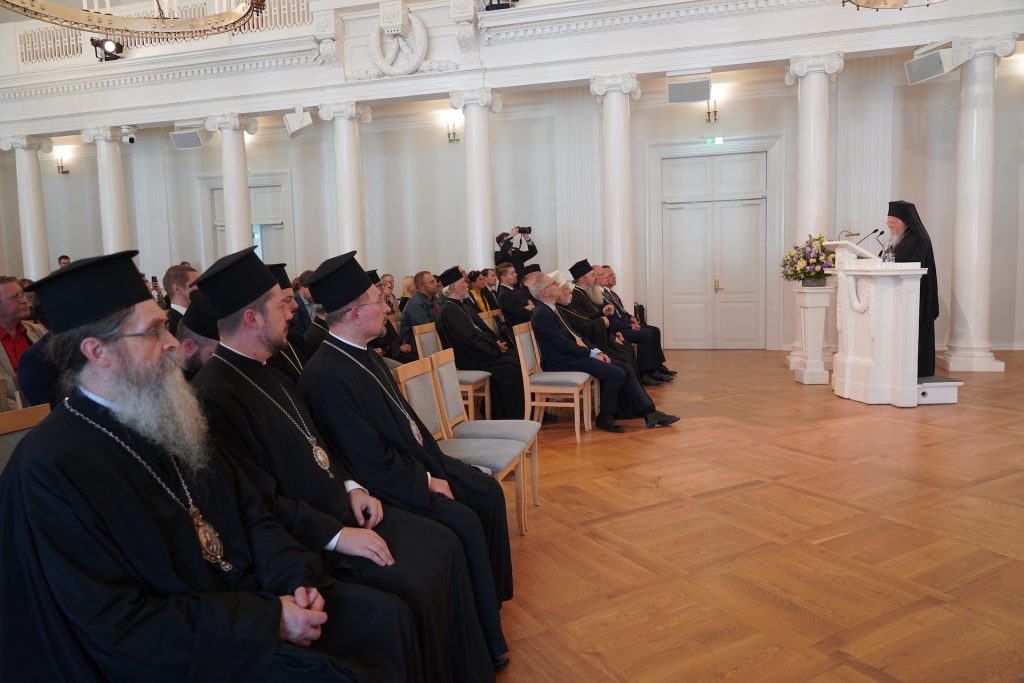
The Ecumenical Patriarchate was the first to promote the ecophilic message of Christianity and characterize the destruction of the natural environment as a “sin”. Our exploitative attitude towards creation is a consequence of our alienation from God, the “bad alteration” of our freedom. The attack on the natural environment is always preceded by an internal spiritual and moral upheaval. The Biblical truth applies here, that “a rotten tree” inevitably produces “wicked fruit” (Matthew 5:17).
Proclaiming that the eco-destructive trend has spiritual causes, we emphasized at the same time that the effort to deal with it must begin at the spiritual level. The contribution of science and technology is not enough, nor are the political decisions and changes in the functioning of the economy, nor those in agricultural and industrial production, as important as all these should be considered. We need a radical change in our mentality and values, in our relationship with the world and in how we give meaning to our lives. Obviously, if we see the world as a creation of God and man as a creature in the image of God and in His likeness, then our behavior is completely different. Then man cannot see himself as an owner, sovereign and unscrupulous exploiter of creation.
Genuine faith in God abolishes the arrogance and megalomania of man, who objectifies and instrumentalizes creation for the satisfaction of his immeasurable pursuits and needs. The entire life of the Church, its divine worship, its ascetic and communal ethos, its consideration of the world as a gift from Above, have an ecological reference. In itself, the Church is a victory against all those forces, which, ideologically and practically, contribute to ecological destruction such as greed, the self-deification of man, as well as self-centeredness and indifference to fellow man. Indeed, the life of the Church is “applied ecology”.
From the beginning we underlined the social dimensions of the ecological crisis and the common root of environmental and social problems. Man’s distance from God has as its result the disruption of his relations with nature and fellow human beings. It is unthinkable to destroy the natural environment and to claim that we care about people and vice versa. Protection of nature and genuine respect for our neighbor are inseparable. In the end, the absence of interest in the people around us and in the natural environment is indifference to God’s commandments. God is glorified wherever there is solidarity and love and when we fight for the protection of nature.
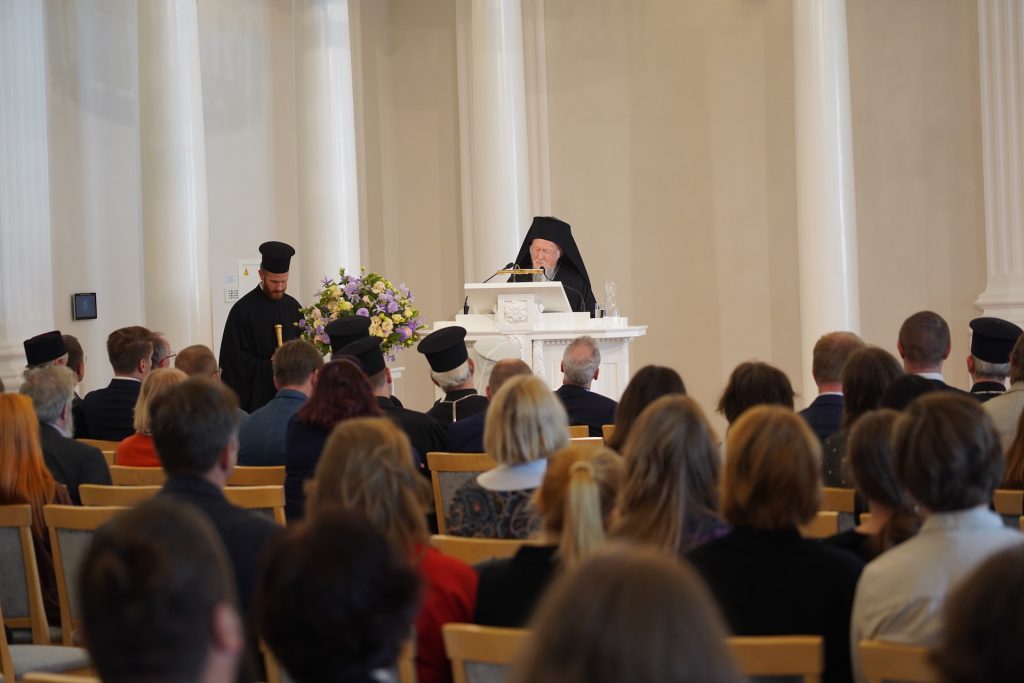
Beloved in attendance today,
Childhood and adolescence are the most pedagogically appropriate periods in a person’s life for ecological and social awareness, to instill respect in the mind and heart for the sanctity of the person and the integrity and beauty of creation. We consider education to be of key importance for humanity’s path towards the future. Education is called upon today, and will be called upon with greater emphasis in the future, to play a decisive role in the issue of “double solidarity” with creation and fellow human beings, in making the new generation understand the seriousness of the crisis and the value of mobilizing to deal with a problem which is more serious than we want to admit. No one can dispute the fact that nature itself is becoming an increasingly severe threat to human life, due to the ongoing disasters that humans are causing to it. Climate change, as an immense planetary threat, certifies the truth of this argument. That is why it has been rightly said that today “an education without an ecological orientation is a parody of education”. It is also no coincidence that, also because of the importance of education for the protection of nature, educational work can be characterized as a “holy mission”. Teaching must cultivate the spiritual nature of man, imprint high values on the souls of youths, while supporting human beings’ desire for social contribution and serving the common good.
This dimension of education has universal scope, and the Orthodox Church has always given special importance to it in its educational tradition. We regard the values of Orthodoxy to be highly relevant today because they link progress with the protection of the human person and the integrity of creation. Indeed, it is not possible for there to be true human development on an ecologically broken planet.
In this spirit, the Church, in the context of Christian formation, highlights the philanthropic and ecophilic content of our faith, creates incentives for the new generation for personal witness and activity in the field of environmental protection and solidarity with fellow human beings based on the Christian ethos. Young men and women must understand that this testimony is not only an external and additional dimension of church life, but that it belongs to its core and is a vital expression of the identity of the faithful.
With these thoughts and sentiments, we thank the Mayor for the kind invitation, we express our congratulations to the organizers and contributors to this beautiful event and our joy in meeting all of you, and invoke upon all of you and your loved ones, the grace and the blessing of the God of wisdom and love.
Thank you for your kind attention!
photos: Nikos Papachristou
